初中英语语法简单句陈述句疑问句等教案
- 格式:doc
- 大小:30.50 KB
- 文档页数:3
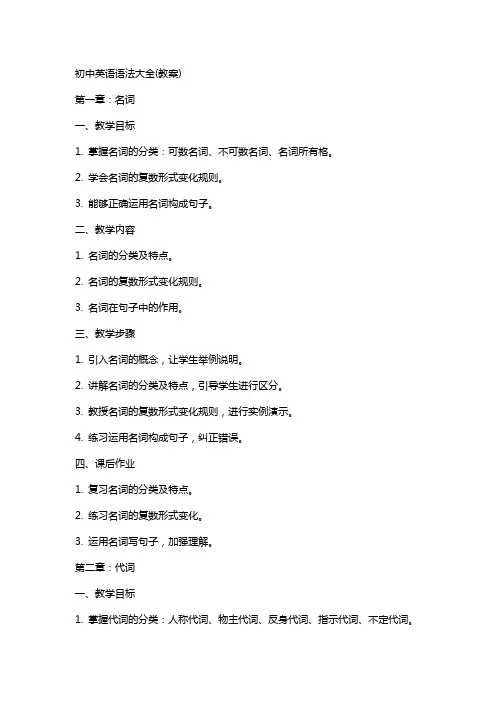
初中英语语法大全(教案)第一章:名词一、教学目标1. 掌握名词的分类:可数名词、不可数名词、名词所有格。
2. 学会名词的复数形式变化规则。
3. 能够正确运用名词构成句子。
二、教学内容1. 名词的分类及特点。
2. 名词的复数形式变化规则。
3. 名词在句子中的作用。
三、教学步骤1. 引入名词的概念,让学生举例说明。
2. 讲解名词的分类及特点,引导学生进行区分。
3. 教授名词的复数形式变化规则,进行实例演示。
4. 练习运用名词构成句子,纠正错误。
四、课后作业1. 复习名词的分类及特点。
2. 练习名词的复数形式变化。
3. 运用名词写句子,加强理解。
第二章:代词一、教学目标1. 掌握代词的分类:人称代词、物主代词、反身代词、指示代词、不定代词。
2. 学会代词的用法及注意事项。
3. 能够正确运用代词构成句子。
二、教学内容1. 代词的分类及特点。
2. 代词的用法及注意事项。
3. 代词在句子中的作用。
三、教学步骤1. 引入代词的概念,让学生举例说明。
2. 讲解代词的分类及特点,引导学生进行区分。
3. 教授代词的用法及注意事项,进行实例演示。
4. 练习运用代词构成句子,纠正错误。
四、课后作业1. 复习代词的分类及特点。
2. 练习代词的用法及注意事项。
3. 运用代词写句子,加强理解。
第三章:形容词和副词一、教学目标1. 掌握形容词和副词的分类及特点。
2. 学会形容词和副词的比较级和最高级形式变化。
3. 能够正确运用形容词和副词构成句子。
二、教学内容1. 形容词和副词的分类及特点。
2. 形容词和副词的比较级和最高级形式变化规则。
3. 形容词和副词在句子中的作用。
三、教学步骤1. 引入形容词和副词的概念,让学生举例说明。
2. 讲解形容词和副词的分类及特点,引导学生进行区分。
3. 教授形容词和副词的比较级和最高级形式变化规则,进行实例演示。
4. 练习运用形容词和副词构成句子,纠正错误。
四、课后作业1. 复习形容词和副词的分类及特点。
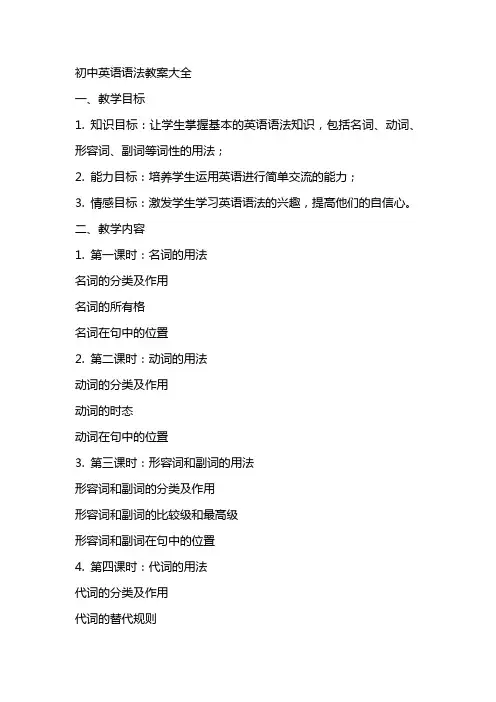
初中英语语法教案大全一、教学目标1. 知识目标:让学生掌握基本的英语语法知识,包括名词、动词、形容词、副词等词性的用法;2. 能力目标:培养学生运用英语进行简单交流的能力;3. 情感目标:激发学生学习英语语法的兴趣,提高他们的自信心。
二、教学内容1. 第一课时:名词的用法名词的分类及作用名词的所有格名词在句中的位置2. 第二课时:动词的用法动词的分类及作用动词的时态动词在句中的位置3. 第三课时:形容词和副词的用法形容词和副词的分类及作用形容词和副词的比较级和最高级形容词和副词在句中的位置4. 第四课时:代词的用法代词的分类及作用代词的替代规则代词在句中的位置5. 第五课时:简单句的结构句子的基本成分句子的一致性句子类型及其用法三、教学方法1. 采用任务型教学法,让学生在实际操作中掌握语法知识;2. 运用游戏、竞赛等互动活动,激发学生的学习兴趣;3. 分层教学,关注学生的个体差异,确保每个学生都能跟上教学进度。
四、教学评价1. 课堂参与度:观察学生在课堂活动中的积极参与情况;2. 作业完成情况:检查学生语法练习的准确性及完成速度;3. 单元测试:评估学生对所学语法知识的掌握程度。
五、教学资源1. 教材:人教版《新目标》初中英语教材;2. 课件:根据教学内容制作的课件;3. 练习题:针对各个语法点设计的练习题;4. 教学道具:如图片、卡片等辅助教学物品。
六、第六课时:情态动词的用法情态动词的分类及作用情态动词后面跟动词原形情态动词在句中的位置七、第七课时:疑问词的用法疑问词的分类及作用疑问词在句子中的位置特殊疑问句的构成及用法八、第八课时:并列句和复合句并列句的类型及连接词并列句的用法复合句的类型及连接词复合句的用法九、第九课时:间接引语和直接引语直接引语和间接引语的定义直接引语和间接引语的转换引语在句子中的标点符号十、第十课时:英语语法总结对前面学过的语法知识进行复习和总结通过练习题检测学生对语法知识的掌握程度针对学生的掌握情况,进行查漏补缺十一、第十一课时:时态的用法一般现在时现在进行时现在完成时一般过去时过去进行时过去完成时一般将来时将来进行时将来完成时十二、第十二课时:被动语态的用法被动语态的构成被动语态的用法被动语态的时态变化十三、第十三课时:虚拟语气的用法虚拟语气的定义虚拟语气的分类及用法虚拟语气在句子中的表达方式十四、第十四课时:非谓语动词的用法非谓语动词的分类及作用非谓语动词在句中的位置非谓语动词的时态变化十五、第十五课时:英语语法综合练习对前面学过的语法知识进行综合练习通过练习题检测学生对语法知识的掌握程度针对学生的掌握情况,进行查漏补缺十一、第十一课时:英语语法与写作技巧介绍英语写作中常用的语法结构和技巧通过对范文进行分析,展示语法在写作中的重要性进行写作练习,让学生运用所学的语法知识进行写作十二、第十二课时:英语语法与阅读理解分析英语阅读材料中的语法结构解释语法在理解文章意义中的作用通过阅读练习,提高学生运用语法知识理解文章的能力十三、第十三课时:英语语法与听力理解探讨语法知识在听力理解中的重要性分析听力材料中的语法结构和用法通过听力练习,加强学生运用语法知识理解口语的能力十四、第十四课时:英语语法与翻译技巧介绍英语与中文在语法结构上的差异讲解翻译中常用的语法转换技巧进行翻译练习,提高学生运用语法知识进行翻译的能力十五、第十五课时:英语语法期末复习与测试对整个学期的语法知识进行总结复习通过测试题检测学生对语法知识的掌握程度根据学生的测试结果,进行针对性的辅导和复习,为期末考试做好充分准备重点和难点解析1. 词性用法:名词、动词、形容词、副词等词性的用法是英语语法的基础,需要学生熟练掌握。
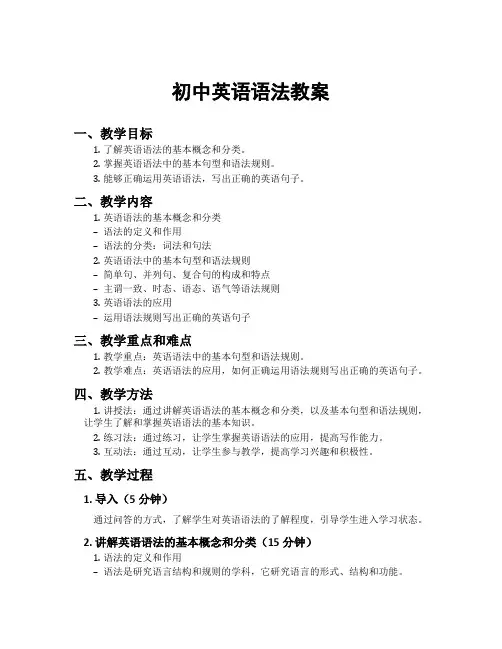
初中英语语法教案一、教学目标1.了解英语语法的基本概念和分类。
2.掌握英语语法中的基本句型和语法规则。
3.能够正确运用英语语法,写出正确的英语句子。
二、教学内容1.英语语法的基本概念和分类–语法的定义和作用–语法的分类:词法和句法2.英语语法中的基本句型和语法规则–简单句、并列句、复合句的构成和特点–主谓一致、时态、语态、语气等语法规则3.英语语法的应用–运用语法规则写出正确的英语句子三、教学重点和难点1.教学重点:英语语法中的基本句型和语法规则。
2.教学难点:英语语法的应用,如何正确运用语法规则写出正确的英语句子。
四、教学方法1.讲授法:通过讲解英语语法的基本概念和分类,以及基本句型和语法规则,让学生了解和掌握英语语法的基本知识。
2.练习法:通过练习,让学生掌握英语语法的应用,提高写作能力。
3.互动法:通过互动,让学生参与教学,提高学习兴趣和积极性。
五、教学过程1. 导入(5分钟)通过问答的方式,了解学生对英语语法的了解程度,引导学生进入学习状态。
2. 讲解英语语法的基本概念和分类(15分钟)1.语法的定义和作用–语法是研究语言结构和规则的学科,它研究语言的形式、结构和功能。
–语法的作用是帮助人们理解和运用语言。
2.语法的分类:词法和句法–词法是研究词的形态、构成和意义的学科。
–句法是研究句子的结构和语法规则的学科。
3. 讲解英语语法中的基本句型和语法规则(30分钟)1.简单句、并列句、复合句的构成和特点–简单句:由一个主语和一个谓语构成的句子。
–并列句:由两个或两个以上的简单句通过并列连词连接而成的句子。
–复合句:由一个主句和一个或多个从句构成的句子。
2.主谓一致、时态、语态、语气等语法规则–主谓一致:主语和谓语在人称和数上要保持一致。
–时态:表示动作发生的时间,包括一般现在时、一般过去时、一般将来时等。
–语态:表示动作的主语和动作的关系,包括主动语态和被动语态。
–语气:表示说话人对所说内容的态度,包括陈述语气、祈使语气、虚拟语气等。
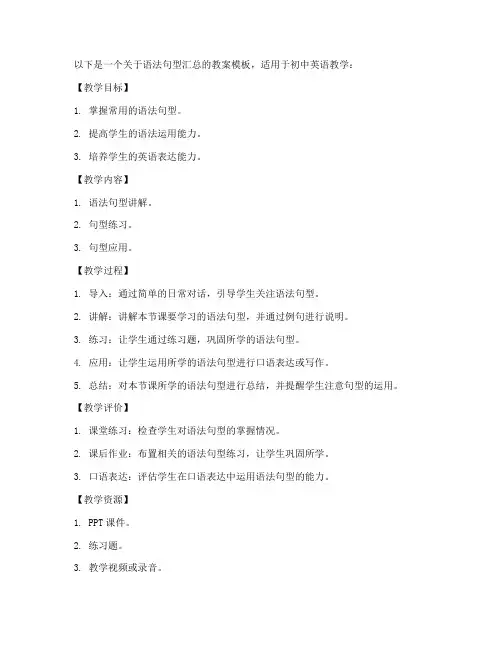
以下是一个关于语法句型汇总的教案模板,适用于初中英语教学:【教学目标】1. 掌握常用的语法句型。
2. 提高学生的语法运用能力。
3. 培养学生的英语表达能力。
【教学内容】1. 语法句型讲解。
2. 句型练习。
3. 句型应用。
【教学过程】1. 导入:通过简单的日常对话,引导学生关注语法句型。
2. 讲解:讲解本节课要学习的语法句型,并通过例句进行说明。
3. 练习:让学生通过练习题,巩固所学的语法句型。
4. 应用:让学生运用所学的语法句型进行口语表达或写作。
5. 总结:对本节课所学的语法句型进行总结,并提醒学生注意句型的运用。
【教学评价】1. 课堂练习:检查学生对语法句型的掌握情况。
2. 课后作业:布置相关的语法句型练习,让学生巩固所学。
3. 口语表达:评估学生在口语表达中运用语法句型的能力。
【教学资源】1. PPT课件。
2. 练习题。
3. 教学视频或录音。
【教学步骤】1. 导入:(1)教师与学生进行简单的日常对话,如问候、询问身体状况等。
(2)引导学生关注对话中的语法句型。
2. 讲解:(1)讲解本节课要学习的语法句型,如:疑问句、否定句、祈使句等。
(2)通过例句说明句型的用法。
3. 练习:(1)让学生完成练习题,巩固所学的语法句型。
(2)教师批改练习题,及时反馈学生的学习情况。
4. 应用:(1)让学生运用所学的语法句型进行口语表达。
(2)教师评估学生的口语表达情况。
5. 总结:(1)对本节课所学的语法句型进行总结。
(2)提醒学生注意句型的运用。
6. 课后作业:(1)布置相关的语法句型练习。
(2)要求学生按时完成作业,并提交。
【教学反思】本节课通过讲解、练习和应用环节,帮助学生掌握常用的语法句型。
在教学过程中,要注意关注学生的学习情况,及时给予反馈和指导。
同时,注重培养学生的英语表达能力,提高他们的语法运用能力。
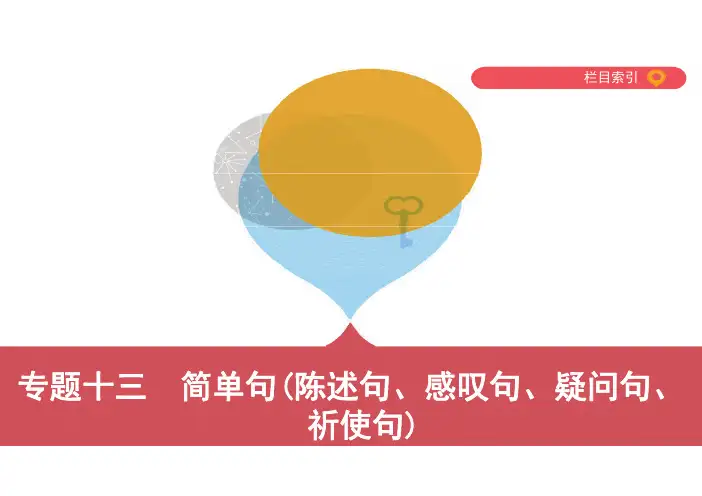
栏目索引专题十三 简单句(陈述句、感叹句、疑问句、祈使句)总纲目录栏目索引栏目索引考点突破考点一 陈述句及疑问句考点突破陈述句陈述句用来陈述一件事或表达一种看法,有肯定和否定两种形式,句末通常用句号,读降调。
一、陈述句的肯定式结构:主语+谓语+其他。
如:That boy often helps others.那个男孩经常帮助别人。
考点突破栏目索引I went to the cinema yesterday.昨天我去看电影了。
二、陈述句的否定式1.be的否定式(1)be用作系动词时,陈述句结构为:主语+be+not+表语+其他。
如:She is not a teacher.她不是一个老师。
(2)be用作助动词,用于be doing/be going to do/be done等时态或被动语态中,陈述句结构为:主语+be+not+动词的现在分词或过去分词+其他。
如:Jim isn't playing football.吉姆没在踢足球。
The sweater isn't made of wool.这件毛衣不是羊毛做的。
栏目索引考点突破2.助动词、情态动词的否定式Man can't live without water.没有水人类不能生存。
3.除not外,其他否定词也可以构成否定句(1)用no表示,no=not any/a(n)。
如:He has no sisters.=He doesn't have any sisters.他没有姐妹。
(2)never绝不,从来不。
如:I have never seen such a man.我从没见过这样的人。
栏目索引考点突破(3)little,few几乎没有。
如:There are few students in the classroom.教室里几乎没有学生。
(4)no one/nobody 没有人。
如:No one/Nobody is interested in the book.没有人对这本书感兴趣。
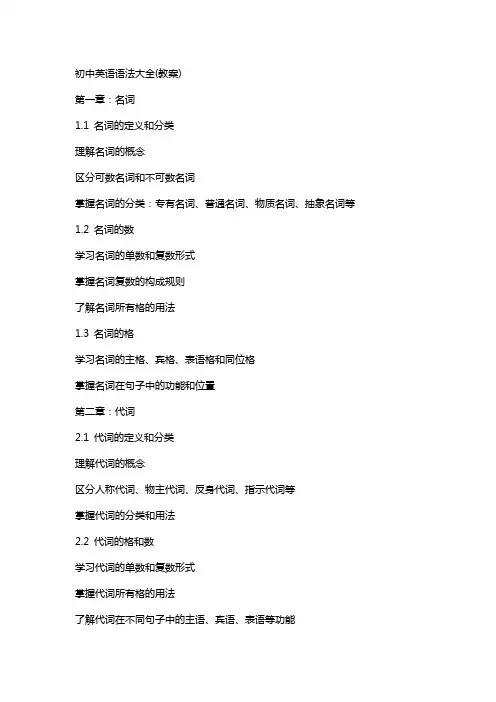
初中英语语法大全(教案)第一章:名词1.1 名词的定义和分类理解名词的概念区分可数名词和不可数名词掌握名词的分类:专有名词、普通名词、物质名词、抽象名词等1.2 名词的数学习名词的单数和复数形式掌握名词复数的构成规则了解名词所有格的用法1.3 名词的格学习名词的主格、宾格、表语格和同位格掌握名词在句子中的功能和位置第二章:代词2.1 代词的定义和分类理解代词的概念区分人称代词、物主代词、反身代词、指示代词等掌握代词的分类和用法2.2 代词的格和数学习代词的单数和复数形式掌握代词所有格的用法了解代词在不同句子中的主语、宾语、表语等功能2.3 代词的替代作用学习代词的替代功能和规则掌握代词在避免重复和替代特定名词时的用法第三章:形容词和副词3.1 形容词的定义和分类理解形容词的概念区分形容词的性质:限定形容词、描绘形容词、疑问形容词等掌握形容词的分类和用法3.2 形容词的位置和比较级学习形容词在句子中的位置和作用掌握形容词的比较级和最高级的构成规则了解形容词比较级和最高级的用法3.3 副词的定义和分类理解副词的概念区分副词的性质:限定副词、描绘副词、疑问副词等掌握副词的分类和用法第四章:动词4.1 动词的定义和分类理解动词的概念区分实义动词、助动词、情态动词等掌握动词的分类和用法4.2 动词的时态学习动词的过去式、现在式、将来式等时态掌握动词时态的构成和用法了解动词时态在句子中的表达方式4.3 动词的语态学习动词的主动语态和被动语态掌握动词语态的构成和用法了解动词语态在句子中的表达方式第五章:句子结构5.1 句子的基本成分学习句子的基本成分:主语、谓语、宾语、定语、状语等掌握句子成分的作用和位置5.2 句子的类型学习陈述句、疑问句、祈使句、感叹句等句型掌握不同句型的结构和用法5.3 句子的并列和从句学习句子并列的连接词和用法掌握并列句的构成和特点学习从句的分类和用法第六章:情态动词6.1 情态动词的定义和分类理解情态动词的概念区分can、may、must、shall、will等情态动词掌握情态动词的分类和用法6.2 情态动词的疑问句和否定句学习情态动词用于疑问句的构成和语调掌握情态动词用于否定句的构成和用法6.3 情态动词的时态搭配学习情态动词与不同动词时态的搭配用法掌握情态动词在各种时态中的表达方式第七章:介词和连词7.1 介词的定义和分类理解介词的概念区分地点、时间、方向、方式等介词掌握介词的分类和用法7.2 连词的定义和分类理解连词的概念区分并列连词、从属连词、副词连词等掌握连词的分类和用法7.3 介词和连词在句子中的作用学习介词和连词在句子中的作用和搭配掌握介词短语和连词短语的用法第八章:句子类型和转换8.1 简单句、并列句和复合句学习简单句、并列句和复合句的结构和特点掌握不同句子类型的用法和转换8.2 被动句和主动句的转换学习被动句和主动句的构成和用法掌握被动句和主动句的转换方法和技巧8.3 疑问句和否定句的转换学习疑问句和否定句的构成和用法掌握疑问句和否定句的转换方法和技巧第九章:时态9.1 一般现在时学习一般现在时的构成和用法掌握一般现在时在句子中的表达方式9.2 一般过去时学习一般过去时的构成和用法掌握一般过去时在句子中的表达方式9.3 一般将来时学习一般将来时的构成和用法掌握一般将来时在句子中的表达方式第十章:复习和练习10.1 复习重点语法知识复习前面章节所学的重点语法知识巩固学生对语法知识的理解和运用能力10.2 练习题和活动设计不同难度的练习题和活动让学生通过练习和活动巩固语法知识,提高运用能力重点和难点解析六、情态动词的教学:情态动词是英语中非常重要的语法点,它们不仅表示可能性、必要性、意愿等,还常常用于构成疑问句和否定句。
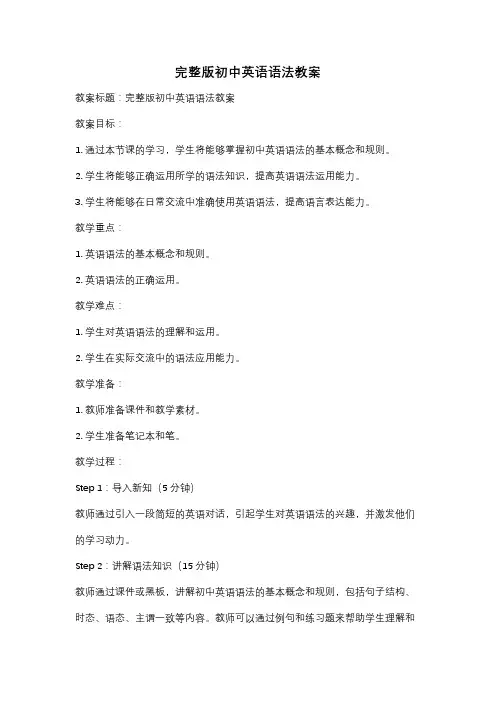
完整版初中英语语法教案教案标题:完整版初中英语语法教案教案目标:1. 通过本节课的学习,学生将能够掌握初中英语语法的基本概念和规则。
2. 学生将能够正确运用所学的语法知识,提高英语语法运用能力。
3. 学生将能够在日常交流中准确使用英语语法,提高语言表达能力。
教学重点:1. 英语语法的基本概念和规则。
2. 英语语法的正确运用。
教学难点:1. 学生对英语语法的理解和运用。
2. 学生在实际交流中的语法应用能力。
教学准备:1. 教师准备课件和教学素材。
2. 学生准备笔记本和笔。
教学过程:Step 1:导入新知(5分钟)教师通过引入一段简短的英语对话,引起学生对英语语法的兴趣,并激发他们的学习动力。
Step 2:讲解语法知识(15分钟)教师通过课件或黑板,讲解初中英语语法的基本概念和规则,包括句子结构、时态、语态、主谓一致等内容。
教师可以通过例句和练习题来帮助学生理解和掌握语法知识。
Step 3:练习与巩固(20分钟)教师设计一系列的练习题,让学生在课堂上进行个人或小组练习。
教师可以提供一些填空题、改错题或翻译题,让学生运用所学的语法知识进行实际操作。
Step 4:合作交流(10分钟)教师组织学生进行合作交流,让学生互相检查和纠正彼此的练习答案。
教师可以提供一些问题,让学生进行讨论和分享自己的观点和答案。
Step 5:拓展延伸(10分钟)教师提供一些拓展延伸的学习资源,如英语语法网站、相关书籍等,让学生在课后继续深入学习和巩固所学的语法知识。
Step 6:课堂总结(5分钟)教师对本节课的内容进行总结,并强调学生在日常学习中的语法应用重要性。
教师可以鼓励学生积极参与课堂讨论和提问,以提高他们的语法学习效果。
Step 7:作业布置(5分钟)教师布置相关的作业,如完成练习题、读写作业等,以巩固学生在课堂上所学的语法知识。
教学反思:本节课通过引入、讲解、练习和拓展等环节,全面提高学生的英语语法水平。
通过课堂上的合作交流和课后的作业布置,学生能够在实际交流中准确运用英语语法,提高他们的语言表达能力。
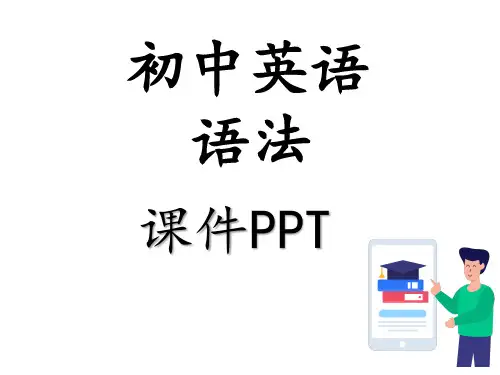
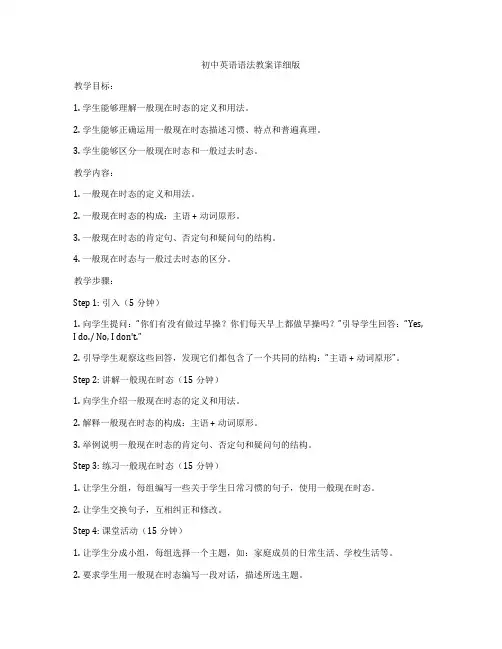
初中英语语法教案详细版教学目标:1. 学生能够理解一般现在时态的定义和用法。
2. 学生能够正确运用一般现在时态描述习惯、特点和普遍真理。
3. 学生能够区分一般现在时态和一般过去时态。
教学内容:1. 一般现在时态的定义和用法。
2. 一般现在时态的构成:主语 + 动词原形。
3. 一般现在时态的肯定句、否定句和疑问句的结构。
4. 一般现在时态与一般过去时态的区分。
教学步骤:Step 1: 引入(5分钟)1. 向学生提问:“你们有没有做过早操?你们每天早上都做早操吗?”引导学生回答:“Yes,I do./ No, I don't.”2. 引导学生观察这些回答,发现它们都包含了一个共同的结构:“主语 + 动词原形”。
Step 2: 讲解一般现在时态(15分钟)1. 向学生介绍一般现在时态的定义和用法。
2. 解释一般现在时态的构成:主语 + 动词原形。
3. 举例说明一般现在时态的肯定句、否定句和疑问句的结构。
Step 3: 练习一般现在时态(15分钟)1. 让学生分组,每组编写一些关于学生日常习惯的句子,使用一般现在时态。
2. 让学生交换句子,互相纠正和修改。
Step 4: 课堂活动(15分钟)1. 让学生分成小组,每组选择一个主题,如:家庭成员的日常生活、学校生活等。
2. 要求学生用一般现在时态编写一段对话,描述所选主题。
3. 让学生上台表演对话,其他学生听后进行评价和纠正。
Step 5: 总结和作业(5分钟)1. 回顾一般现在时态的定义、用法和结构。
2. 强调一般现在时态与一般过去时态的区分。
3. 布置作业:让学生用一般现在时态写一篇短文,描述自己的日常生活。
教学评价:1. 观察学生在课堂上的参与度和积极性。
2. 检查学生编写句子和对话的正确性和流利度。
3. 批改学生的作业,评估他们对一般现在时态的理解和运用能力。
备注:本教案根据学生的实际情况进行了适当的调整,以满足不同学生的学习需求。
教师在教学过程中应注重引导学生主动参与,鼓励他们积极练习,提高他们的英语水平。
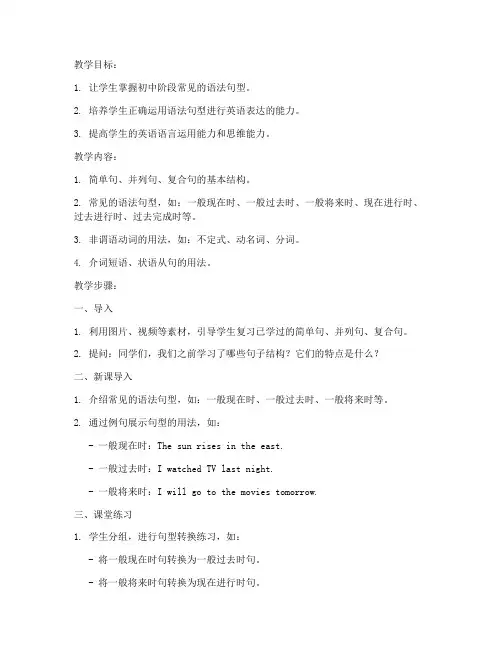
教学目标:1. 让学生掌握初中阶段常见的语法句型。
2. 培养学生正确运用语法句型进行英语表达的能力。
3. 提高学生的英语语言运用能力和思维能力。
教学内容:1. 简单句、并列句、复合句的基本结构。
2. 常见的语法句型,如:一般现在时、一般过去时、一般将来时、现在进行时、过去进行时、过去完成时等。
3. 非谓语动词的用法,如:不定式、动名词、分词。
4. 介词短语、状语从句的用法。
教学步骤:一、导入1. 利用图片、视频等素材,引导学生复习已学过的简单句、并列句、复合句。
2. 提问:同学们,我们之前学习了哪些句子结构?它们的特点是什么?二、新课导入1. 介绍常见的语法句型,如:一般现在时、一般过去时、一般将来时等。
2. 通过例句展示句型的用法,如:- 一般现在时:The sun rises in the east.- 一般过去时:I watched TV last night.- 一般将来时:I will go to the movies tomorrow.三、课堂练习1. 学生分组,进行句型转换练习,如:- 将一般现在时句转换为一般过去时句。
- 将一般将来时句转换为现在进行时句。
2. 教师巡视指导,纠正学生错误。
四、非谓语动词讲解1. 介绍非谓语动词的概念和用法。
2. 通过例句展示非谓语动词的用法,如:- 不定式:To learn English is important.- 动名词:Reading books is my hobby.- 分词:Hearing the news, she was excited.五、介词短语、状语从句讲解1. 介绍介词短语和状语从句的概念和用法。
2. 通过例句展示介词短语和状语从句的用法,如:- 介词短语:In the morning, we go to school.- 状语从句:When I finish my homework, I will play computer games.六、课堂小结1. 教师总结本节课所学内容,强调重点语法句型。
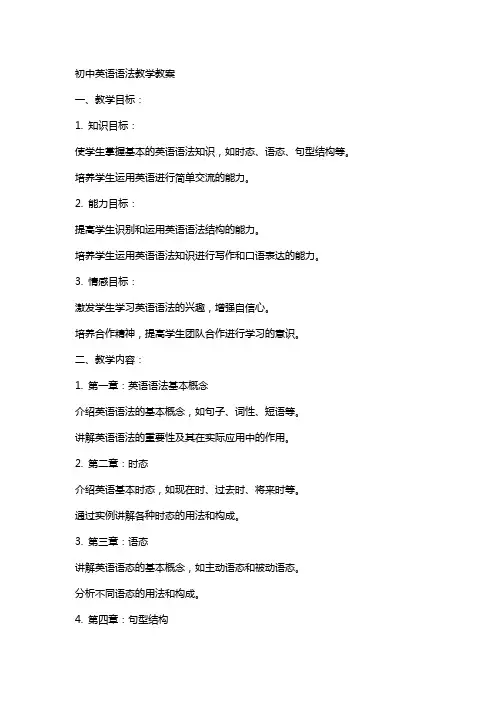
初中英语语法教学教案一、教学目标:1. 知识目标:使学生掌握基本的英语语法知识,如时态、语态、句型结构等。
培养学生运用英语进行简单交流的能力。
2. 能力目标:提高学生识别和运用英语语法结构的能力。
培养学生运用英语语法知识进行写作和口语表达的能力。
3. 情感目标:激发学生学习英语语法的兴趣,增强自信心。
培养合作精神,提高学生团队合作进行学习的意识。
二、教学内容:1. 第一章:英语语法基本概念介绍英语语法的基本概念,如句子、词性、短语等。
讲解英语语法的重要性及其在实际应用中的作用。
2. 第二章:时态介绍英语基本时态,如现在时、过去时、将来时等。
通过实例讲解各种时态的用法和构成。
3. 第三章:语态讲解英语语态的基本概念,如主动语态和被动语态。
分析不同语态的用法和构成。
4. 第四章:句型结构介绍英语句子的基本结构,如主谓结构、主谓宾结构等。
通过实例分析各种句型的特点和应用。
5. 第五章:主谓一致和倒装讲解主谓一致的原则及其应用。
介绍倒装句的用法和构成。
三、教学方法:1. 采用互动式教学法,鼓励学生积极参与课堂讨论和练习。
2. 使用多媒体教学手段,如PPT、视频等,增强课堂趣味性。
3. 通过实例分析和练习,让学生在实际应用中掌握语法知识。
4. 布置课后作业,巩固所学知识,提高学生实际运用能力。
四、教学评估:1. 定期进行课堂测试,检查学生对语法知识的掌握情况。
2. 组织课后作业,评估学生的实际应用能力。
3. 鼓励学生进行自我评估,提高学习意识。
五、教学计划:1. 第一章:2课时2. 第二章:3课时3. 第三章:2课时4. 第四章:3课时5. 第五章:2课时六、第六章:情态动词介绍情态动词的概念和用法,如can、may、must、should等。
分析情态动词在句子中的位置和与其他词的搭配。
七、第七章:名词和冠词讲解名词的分类和用法,如可数名词、不可数名词等。
介绍冠词的概念和用法,如定冠词、不定冠词等。
八、第八章:代词讲解代词的分类和用法,如人称代词、物主代词、指示代词等。
第12单元 简单句、陈述句、一般/特殊/选择/
反意疑问句、祈使句、感叹句
只有一个主语(或并列主语)和一个谓语(或并列谓语)的句子叫简单句。
1.根据句子的结构,简单句可分为5种:
(1)S+V
(2)S+V+O
(3)S+V+P
(4)S+V+InO+DO
(5)S+V+O+C
此外,还有there be句型,这一句型具有就近原则,也即谓语动词用单数还是复数要
看接近于be动词的那个名词。
2.根据句子的功能,简单句可分为4类:
陈述句、疑问句、祈使句、感叹句
(一)陈述句
1.肯定式
2.否定式
(1)加not构成的否定句
(2)由no, hardly, never, nobody, nothing等构成的否定句。
其中两者的全部否定用neither或nor,部分否定用both +not.
『例』 Neither of them knows French.
Both of them don't know French.
三者或三者以上的全部否定用none, nothing, nobody, no one等,部分否定用all, many,
every加not构成
『例』 None of these answers are right.
All these books are not mine.
(3) 在某些句子中,按语意应放在that从句中的否定词not被移前到主句的谓语动
词中,这种否定提前的情况用于think, believe, suppose等动词,『例』 I don't believe it will
be very cold tomorrow.
(二)疑问句
按结构可分为四种
1.一般疑问句:
(1) 用Yes,No来回答的疑问句。
(2) 往往把be,助动词,情态动词置于句首。
(3) 在一般疑问句中,如果提问人对答案没有肯定或否定的意向,句中常用非肯定词。
『例』 Is there anything wrong with your car?
如果提问人对答案有肯定的意向,即希望得到肯定的回答,则在该用非肯定词的地
方用肯定词,如:Would you like some drink?因此,在招待客人或向人表示乐意提供帮助
时,通常用some代替any。
2.特殊疑问句:
用疑问代词或疑问副词提问的句子,不用Yes,No回答。
(1) 疑问词作句子的宾语、状语、表语或修饰这三种成份时,用疑问词+一般疑问句。
『例』 When will you go?
(2) 疑问词作主语或主语的定语时,与陈述句的顺序相同,
『例』 Whose father works in Shanghai?
Who is on duty today?
3.反意疑问句
(1) 构成:陈述句 + 简略问句
肯定 否定
否定 肯定
简略问句的主语与陈述句保持一致,只能用人称代词(there除外),简略问句的谓语动词
也与陈述句保持一致,如果是否定,一定要用简写。
『例』 Jim isn't a student, is he?/There are some books in it, aren't there?
(2) 陈述部分I'm...结构,疑问部分一般用aren't I。
『例』 I'm late, aren't I?
(3) 陈述句中有little, few, no, never, nothing, nobody, hardly等词表示否定时,简略问句用
肯定。
(4) 陈述句中有指物的不定代词nothing, something, anything时,简短问句中用代词it,陈
述句中有指人的不定代词everyone, no one, someone, everybody, nobody, anybody时,简短
问句中用代词he或they。
『例』 Everyone is here, aren't they/isn’t he?
(5) 陈述句的主语是指示代词this, that等时,疑问部分的主语在形式上与前者不同,但在
逻辑上却与前者一致。
『例』 This is very important, isn't it?
(6) 陈述部分如果是“I (don't) think (believe, suppose...)+宾语从句”时,疑问部分中的动词
和主语应与宾语从句中的主语和动词保持一致。
『例』 I don't believe she knows it, does she?
(7) 含有情态动词must的句子表示猜测时,疑问部分与must后面部分一致,不能用mustn't,
如:You must be tired, aren't you?当must表示“有必要”时,疑问部分用needn't,如:You must
go home right now, needn't you?当mustn't表示禁止时,疑问部分一般用must。
『例』 You mustn't walk on grass, must you?
(8) 祈使句的反意疑问句
肯定祈使句+will you/won't you?
否定祈使句+will you?
Let's...+shall we?(包括对方)
Let us...+will you?(不包括对方)
(9) 感叹句的反意疑问句一律用否定式,并用be的一般现在时。
『例』 What a lovely girl, isn't she?
(10) 前面否定后面肯定的反意疑问句在回答时,需根据其实际情况,实际情况是肯定的,
则用Yes+肯定结构,实际情况是否定的,则用No+否定结构。
『例』 —You can't speak English, can you?
—Yes, I can(不,我会的)
(11) 关于“'d”和“'s”
注意比较:
He’d like a cup of tea, wouldn’t he?/You’d better go now, hadn’t you?
He’s never late for school, is he?/He’s never been there, has he?
4.选择疑问句:
选择疑问句是用or连接询问的两部分,以供选择,答案必须是完整的句子或其省略形
式,不能用Yes或No回答。
『例』 -- Are you Jim or Tom?
-- I'm Tom.
(三)祈使句
用以表示命令、请求或建议,主语通常省略。
肯定式谓语用动词原形,否定式用“Don't (Never)+动词原形”,Stand up, please./Don't be
afraid.
(四)感叹句
用以表示快乐、痛苦等强烈感情的句子称为感叹句。
感叹句有用how或what开头的两种形式。
1.How开头的感叹句
(1) How+形容词(副词)+主语+谓语。
『例』 How beautiful the flower is!
(2) How修饰动词,句型是“How+主+谓”。
『例』 How I wish I could hear Beethoven himself play it!
(3) How+形容词(副词),省略主语和谓语。
『例』 How interesting(it is)!
2.what开头的感叹句:
(1) What+(a)+形容词+名词+主语+谓语,如:
『例』 What a nice horse it is!
What fine weather!
What good news!
(2) What(a)+名词!
『例』 What a pity!